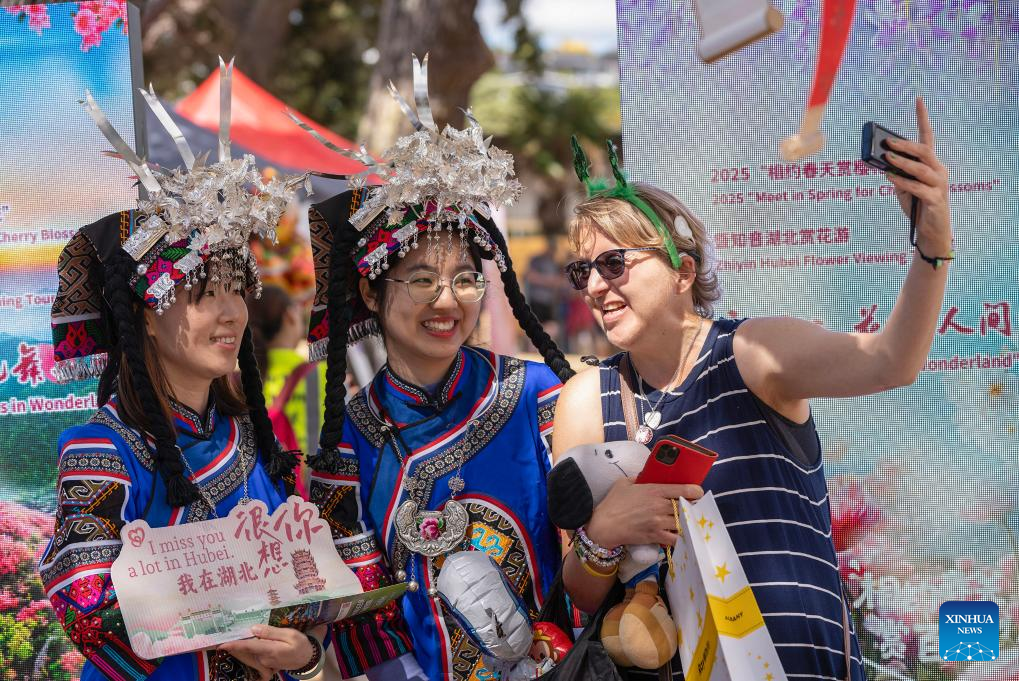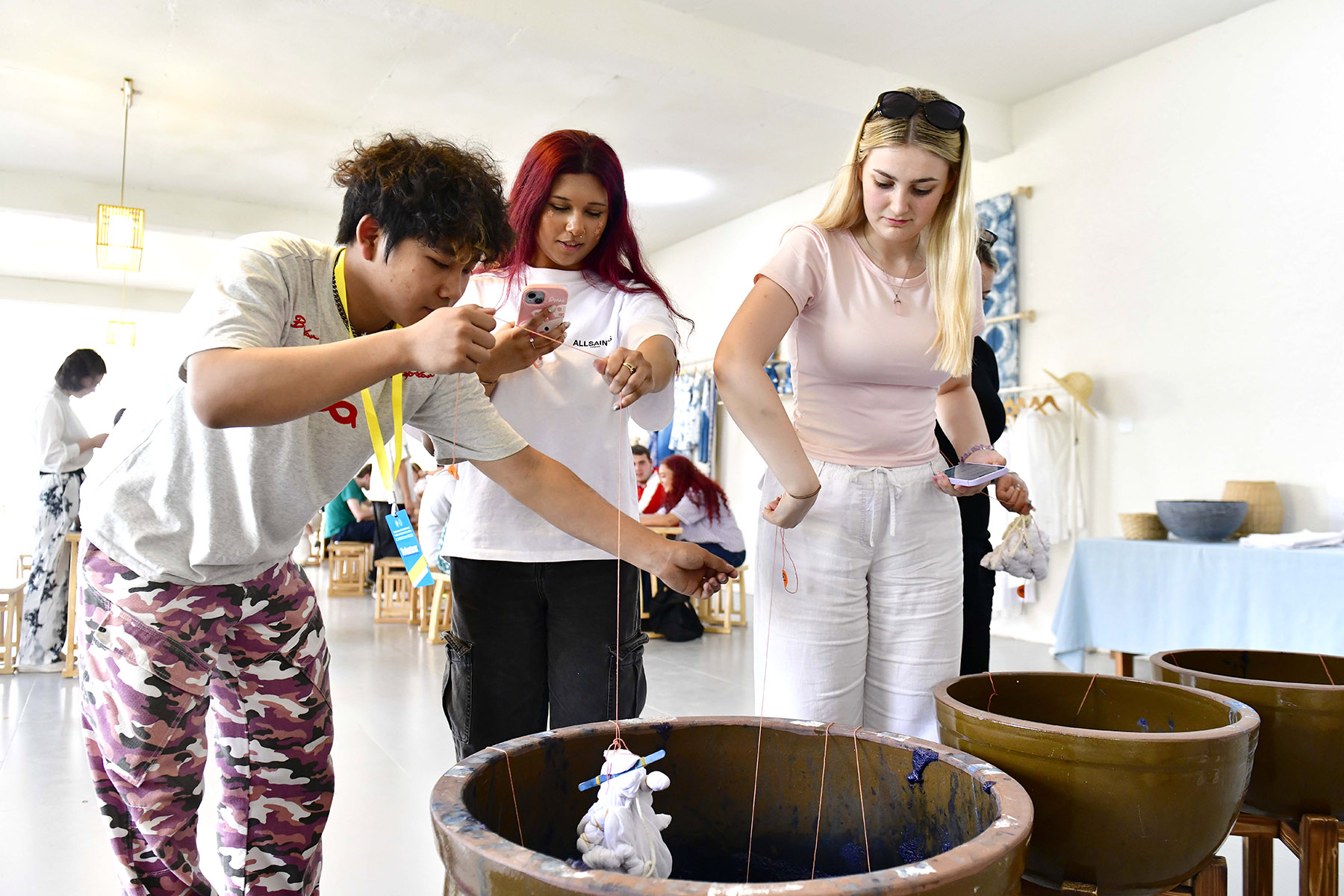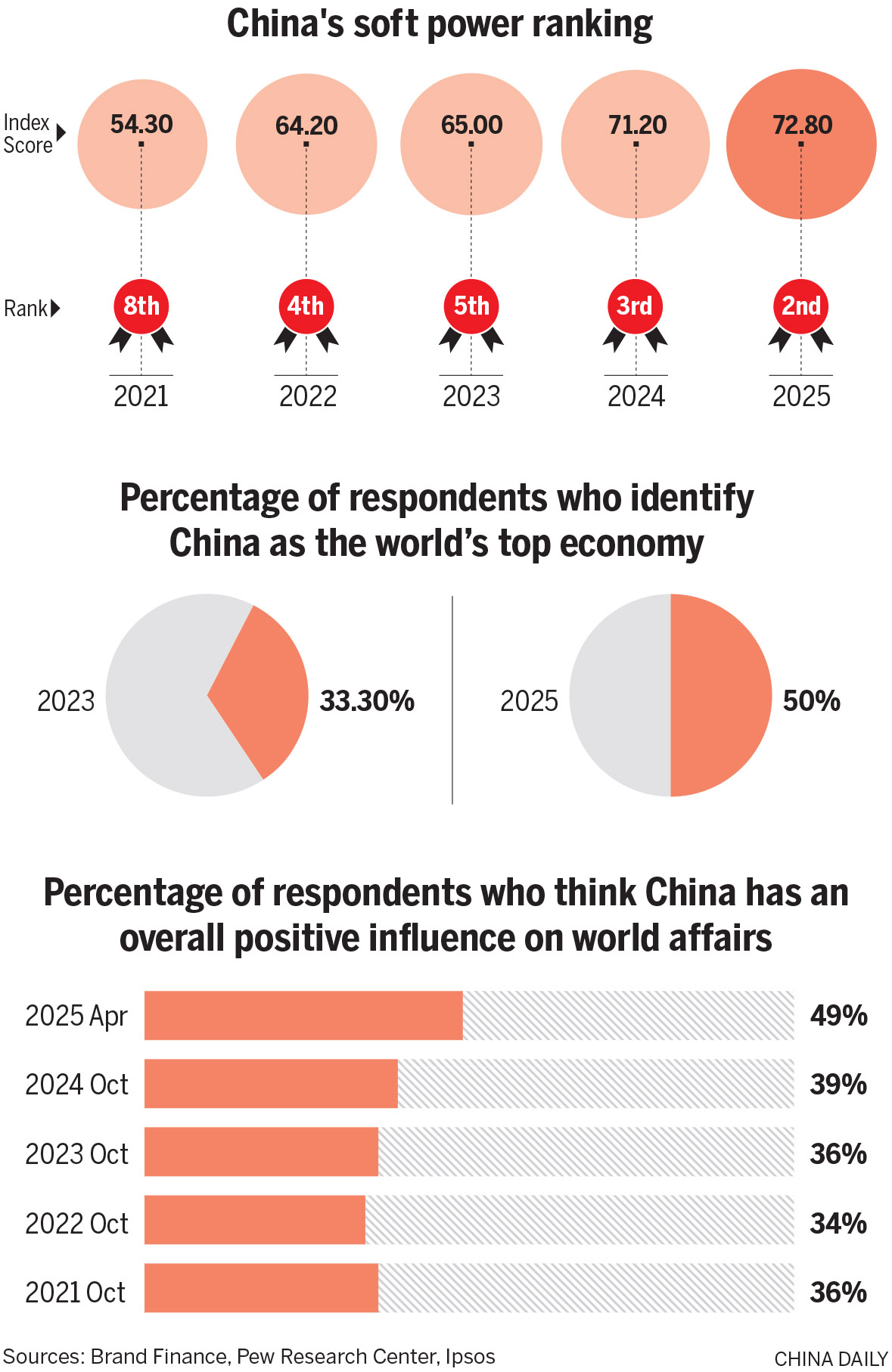Glimpses into reality of everyday life, advancements help change misconceptions

From the whimsical Labubu plush toys captivating collectors worldwide to viral travel vlogs showcasing China's landscapes, and the burgeoning popularity of RedNote bridging cultural divides, China's cultural exports are increasingly capturing global attention.
These seemingly disparate phenomena share a common thread: they offer authentic glimpses into Chinese life, fostering understanding and contributing to a measurable shift in global perceptions of China.
The latest Democracy Perception Index 2025, conducted by Nira Data, reflects this change. Of 96 countries, 76 nations — a remarkable 79 percent — have a more favorable view of China. By comparison, only 20 countries have a more favorable view of the United States. This trend is echoed across multiple surveys, with polling companies like Ipsos and Morning Consult reporting similar upward trends, painting a picture of a nation whose image is rising further in the eyes of the world.
READ MORE: An elf that does not toy with adults
Data from Morning Consult, a US business intelligence agency, shows that a majority of countries have improved their view of China since January 2025. By the end of May, China had an 8.8 net favorability rating, a dramatic turnaround from its negative rating last year.
A recent Pew Research Center study, covering roughly two dozen nations and released on July 15, also found that China's image is improving in many countries. Furthermore, in half of the surveyed nations, more people now consider China the world's leading economic power compared with the US.

Seeing is believing
So, what's driving this transformation? For many, it begins with something as simple as scrolling through their phones.
Mary, a 52-year-old from Colorado, joined social media platform RedNote, or Xiaohongshu, in January, as US TikTok users sought alternatives amid the platform's uncertain future. What began as curiosity soon altered her preconceptions about the nation.
"What surprised me the most is all the stereotypes and misconceptions that I grew up with are gone," she said in a video posted on Red-Note. "Just real people living their real lives … Somehow, sharing my life on RedNote has become the most joyful and meaningful thing that I have ever done."
Mary's experience isn't an isolated one.
Viona Francissca, a 23-year-old Indonesian student at Shanghai International Studies University, has shared her travel experiences in China on social media platforms like Instagram since 2023.
"China is more advanced than I thought, and more futuristic compared to what social media portrays or what we knew before," she told China Daily. "China is a very safe country and very efficient. Everything works very fast here."
She said she didn't know beforehand how different the cities were. "Shanghai to Suzhou is only a one-hour train ride, but the lifestyle, buildings, and environment are very different compared to Shanghai. This makes me interested in traveling to more cities in China," she said.
Matthew Michaels, a 42-year-old accountant from Los Angeles, California, first visited China in 2003, when negative narratives about China were prevalent. "I wasn't sure what to expect," he said, "but my worries were gone within a few minutes of arriving."
After that, he visited China almost yearly until the pandemic curtailed travel. On China's rapid development, he said, "Every year when I came back to China, it was like a decade had passed."
Like many other Americans, Michaels joined the RedNote in January.
"It has been a great experience being able to talk directly with Chinese people, especially with the translation feature, about various topics from economics and geopolitics to video games. It has also been fun watching my own people discover what China is actually like and then spreading the word on other platforms," he said.
He believes authentic content has played a big role in the transformation: "One of the most impactful things to influence people's opinions on China has been the increased visibility into everyday life there. Thanks to livestreams, social media platforms like TikTok, and video content shared by locals and foreigners, people around the world can now see what life in China actually looks like," he said.
"Joining someone in China as they walk through the park or shop at the grocery store feels more impactful than even the most high-budget cultural exports like movies and video games," he added.
Michaels said the recent visit of iShowSpeed, US content creator Darren Jason Watkins Jr who is known for his high-energy videos, was the most high-profile example of this.
In March, the YouTube star livestreamed his two-week China tour, showing views ranging from Shanghai's neon skyline to Shaolin Temple's martial arts legacy to millions of viewers. His videos sparked re-evaluation of the country's image.
The top-rated comment on his first China vlog simply stated: "Decades of anti-China propaganda destroyed by a 20-year-old streamer."

Perceived as prosperous
These individual experiences are mirrored by broader trends. According to the Global Soft Power Index released by Brand Finance in February, China has jumped to second place globally, surpassing the United Kingdom with a score of 72.8 out of 100, its highest ranking yet.
The agency cited China's post-pandemic reopening as a key factor in this improvement.
Atilla Kaan Erisir, a 25-year-old Turkish research assistant at the University of Hong Kong, emphasized the power of firsthand experience in reshaping perceptions.
He said his idea of China was reshaped by his first visit to Hong Kong, his decision to study at Hong Kong University, and his first visit to the Chinese mainland.
Anybody with negative biases about China will change their opinions when they encounter China's technological advancement and the interesting urban planning in megacities such as Beijing, Chongqing and Hong Kong, he added.
Experts believe China's rising appeal is rooted in its tangible achievements.
Jasna Plevnik, president of the Geoeconomic Forum Croatia, said that China's rising global standing is the culmination of long-term investment in infrastructure and the well-being of its citizens.
"The political and economic forces of China have made life better for the majority of the people," she said.
"People in the West share among themselves on Instagram and other Western social media thousands of videos of advanced Chinese cities, and their subways, bridges, and airports. They perceive China as a prosperous country to live in. China's success has become lovely to watch," she added.

International role
More than just recognizing China's development achievements, an increasing number of people believe that China can play a positive and constructive role in international affairs.
A survey conducted across 29 countries, released in April by Ipsos, revealed that China is now perceived as a more positive influence than the US, a first in the 10 years Ipsos has tracked this data.
On average, 49 percent of respondents across the 29 countries believed China will have a positive effect on world affairs, a 10-point increase from six months prior.
Plevnik highlighted China's commitment to multilateralism and shared development as key factors. "Chinese foreign policy is progressive and inclusive, which is the very opposite to great power politics," she said. "China has been fighting a big battle for a multilateral and multipolar world order.
"China's global initiatives represent a major pivot point in global affairs because they are featuring shared development, fostering peace, and strengthening multilateralism," she added.
"That's why the global community perceives China as a power that fights for the global good. China respects the United Nations and wants the world's problems to be solved in the UN. This policy also means large material costs for China."
Mehmood Ul Hassan Khan, president of the Center for Knowledge and Public Policy in Lahore, Pakistan, said that China "has been an icon of global shared prosperity, community development and trans-regional connectivity through the Belt and Road Initiative."
ALSO READ: Chinese animation Ne Zha 2 hits theaters in Middle East
This initiative has positioned China as a key driver of global connectivity, as noted in the Global Power Index 2025 report. The BRI has bolstered China's economic strength and reinforced China's image as a collaborative partner in international development, said the report.
Khan further elaborated on China's growing global influence, pointing out the increasing recognition of its constructive neutrality in world conflicts and its commitment to peaceful conflict resolution through dialogue.
"The worldwide acceptability of the Global Development, Security and Civilization Initiatives China proposed has immensely increased China's role, stature, participation and contribution in the world."
"China's role and perception will further increase because of its proactive role in multilateral organizations like the Shanghai Cooperation Organization and BRICS (Brazil, Russia, India, China and South Africa) and global public affairs, including poverty eradication and green transformation in the world," he concluded.
Wang Huanran and Yang Junyi contributed to this story.
Contact the writer at yangran1@chinadaily.com.cn


